COVID-19: WHY SCOTLAND VS ENGLAND COMPARISONS ARE MISLEADING
04 August 2020
Does the “zero deaths” narrative in Scotland stand up to scrutiny?
-
The “daily deaths” figures quoted in Scotland understate the true extent of COVID-19 deaths
-
Scottish Government advisers are promoting a “zero deaths” narrative which is at odds with the actual data
-
Comparing like-for-like data on COVID-19 deaths in Scotland to South West England (which has a similar population size to Scotland), or with Wales and Northern Ireland, show that claims the Scottish Government's response has produced superior outcomes are, at best, premature
It is well understood that international comparisons are difficult when assessing the effectiveness of government responses to COVID-19. Demographics, population densities, household sizes, the propensity for international travel (inbound and outbound), the quality and availability of data, the definitions of what the data is measuring – these things play an important role in determining the relative vulnerability of a particular nation or area to COVID-19, and to measuring the relative success of official responses.
These issues are just as important within the United Kingdom, and especially important if you want to start arguing about whether one particular nation of the United Kingdom has done “better” than the others.
For the most part this is well understood by UK politicians. There has been very little talk of English, Welsh, or Northern Irish exceptionalism in the COVID-19 response. And in Scotland, Nicola Sturgeon has mostly resisted the temptation.
But in a speech delivered on 3rd July, Sturgeon made an uncharacteristic slip: she claimed the prevalence of COVID-19 in Scotland was five times lower than in England. This earned her a rebuke from the UK Statistics Authority, who said:
We do not think that these sources allow for a quantified and uncaveated comparison of the kind being made here.1Sir David Norgrove to Miles Briggs MSP – Use of COVID-19 prevalence statistics by Scottish Government
Sturgeon’s daily press conferences, on the other hand, are typified by measured and precisely worded communication.
Sturgeon has been careful to mention that the daily deaths number (which has been zero every day since 18th July) includes only deaths of people who have tested positive for COVID-19 within the previous 28 days.
Once a week, the NRS (National Records of Scotland) publishes more complete figures, which capture all deaths registered where COVID-19 was mentioned on the death certificate, regardless of whether it was confirmed with a positive test, or if more than 28 days had passed since a positive test.
The NRS report shows that in the week to 26th July (the latest available data), there were 8 deaths in Scotland where COVID-19 was mentioned on the death certificate, despite zero daily deaths being reported at each day’s daily press conference.
Sturgeon spoke accurately and fairly about the NRS report at her daily press conference on Wednesday 29th July. These were her exact words, explaining that some COVID deaths are not captured by the daily deaths figures:
I want to say just a word or two more about the fact that the number of COVID deaths rose very slightly last week, especially given that we reported no deaths at all over that period in our daily figures.
4 of the 8 deaths reported by NRS were in hospital, 2 were in care homes, and 2 were in other settings, for example at home.
Now, the reason why the 4 deaths in hospitals weren’t captured by our daily figures is that these daily figures, as I’ve mentioned already today, record people who have died within 28 days of testing positive for COVID.
However, some people who test positive receive care for more than 28 days afterwards, but sadly some of them don’t manage to recover.
So if these people die after the initial 28 days, but have COVID recorded on the death certificate as a contributory factor, then they would be included in the NRS report but not in the daily figures.
Again, that’s to give you an assurance that all deaths associated with COVID are being captured and reported between our daily figures and the National Records of Scotland report.2Coronavirus update from the First Minister: 29 July 2020
But it’s an unfortunate consequence of the lower misleading data coming out daily, and the more robust figures only weekly, that the media narrative is overwhelmingly about the daily numbers:
Coronavirus in Scotland: No Covid-19 deaths for ninth day in a row - BBC News, 25th July 2020
Coronavirus in Scotland: No Covid-19 deaths for 13 days but possible cluster revealed in Greater Glasgow area - The Scotsman, 29th July 2020
Coronavirus in Scotland: No new Covid-19 deaths for 16th day as 18 new cases confirmed - The Herald, 1st August 2020
Coronavirus Scotland: No Covid-19 deaths for 18 days but 18 more Scots test positive overnight - The Scottish Sun, 3rd August 2020
Nicola Sturgeon announces 23 new positive cases overnight but no deaths for 19th day - The Daily Record, 4th August 2020
But it isn't just the headline writers who promote this "zero deaths" narrative. Scientists on the Scottish Government’s COVID-19 Advisory Group have been pushing the same line.
To take one example, this was tweeted by Stephen Reicher, Professor of Social Psychology at the University of St Andrews, and a member of the COVID-19 Advisory Group:3https://twitter.com/reicherstephen/status/1288051803393871872?s=21
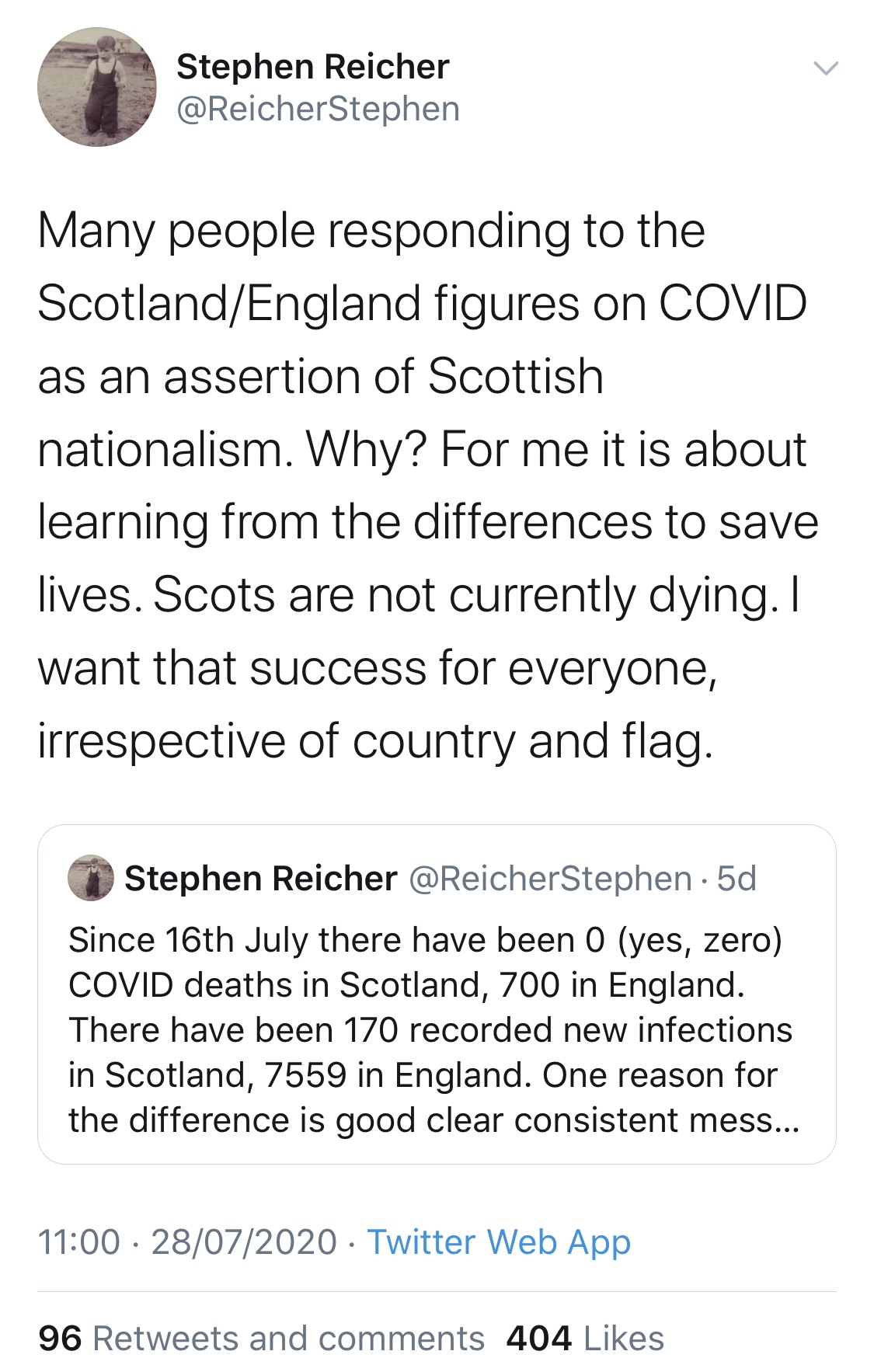
Professor Reicher's tweet was picked up and amplified by SNP politicians. For example:4https://twitter.com/humzayousaf/status/1288034472617807874?s=21
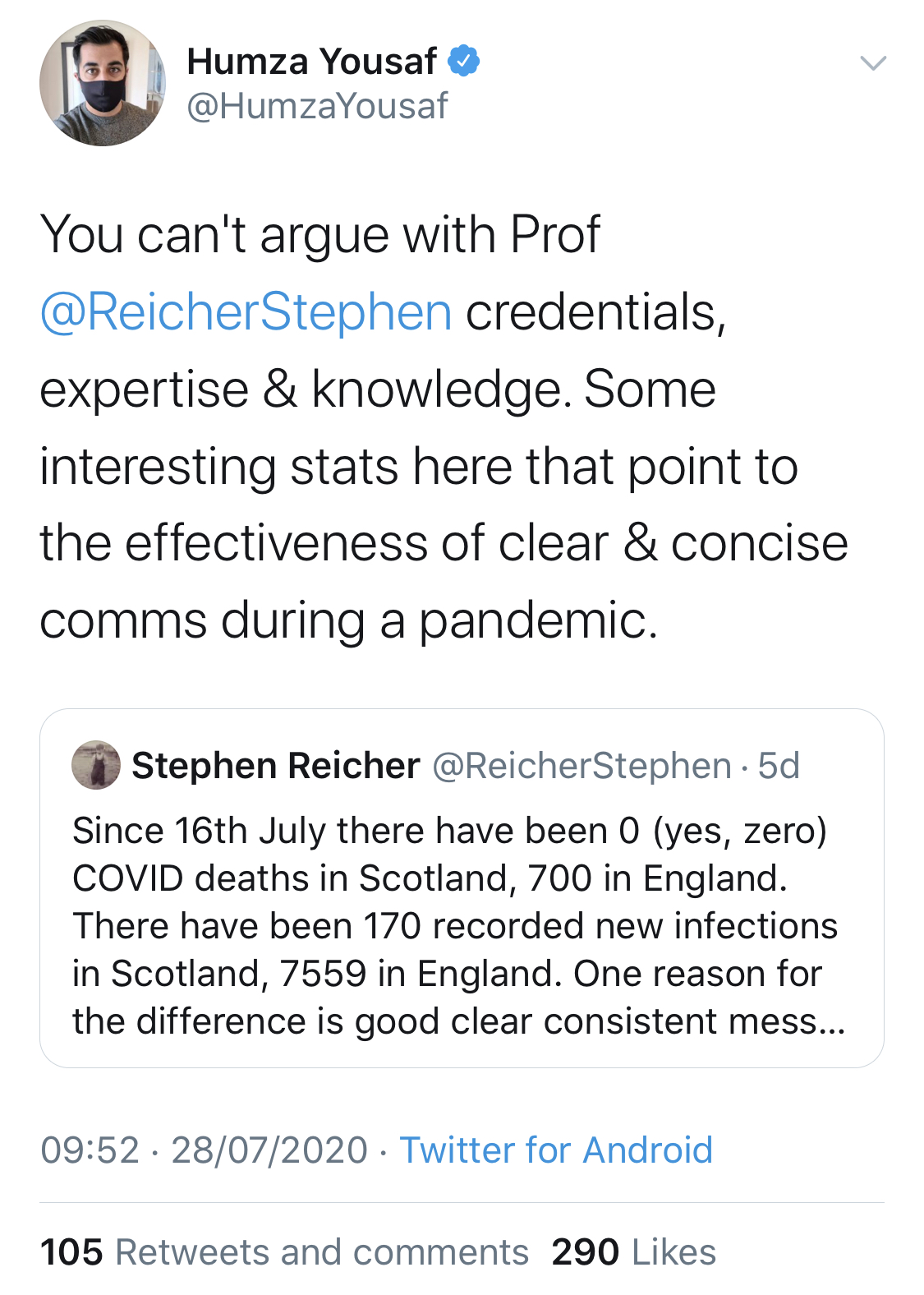
These statements are incorrect:
“Scots are not currently dying”
“Zero COVID deaths in Scotland”
Despite what Humza Yousaf claims, you can argue with Professor Reicher, because these claims cannot be justified (and in fact directly contradict what the First Minister has said in her daily press conferences).
In email correspondence with this author, Professor Reicher denied that his statements were false. For a member of the Scottish Government’s COVID-19 Advisory Group to deny that people in Scotland are currently dying of COVID-19 is truly alarming.
Furthermore, the comparison with England is misleading: the data is not like-for-like.
The daily deaths number reported in Scotland requires a positive COVID-19 test within the previous 28 days, but in England anyone who dies having ever tested positive for COVID-19 (even if they have subsequently recovered) is counted in the daily death number, whatever the actual cause of death. So, for example, someone would be counted as a daily death from COVID-19 in England if they tested positive for COVID-19 in April, made a full recovery, and then died in a road traffic accident in July.
The Scottish daily death numbers certainly miss some people who have died from COVID-19. The English daily death numbers certainly count some people who haven't died from COVID-19.
This is not an isolated incident, and Stephen Reicher is not the only member of the COVID-19 Advisory Group making misleading public statements. Devi Sridhar, Professor and Chair of Global Public Health at the University of Edinburgh, has said similar things:5https://twitter.com/devisridhar/status/1288075463462715395?s=21
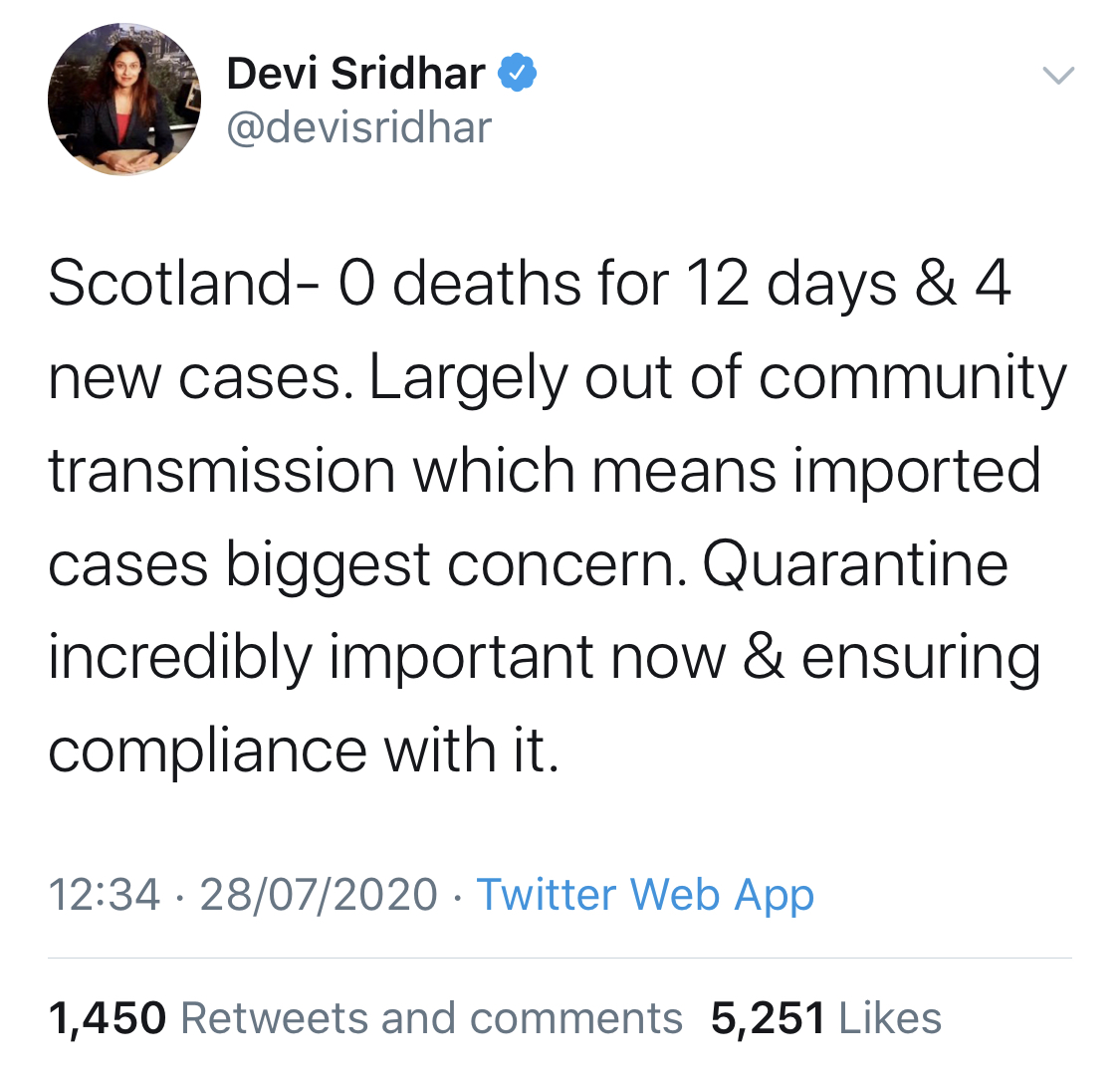
During a 23rd July interview with Channel 4 News6https://twitter.com/channel4news/status/1286369146645745667?s=21, Professor Sridhar was asked how Scotland has performed relative to the rest of the UK:
Krishnan Guru-Murthy: When it comes to infections and deaths: is Scotland doing better than the rest of the United Kingdom, or better than England, proportionally?
Devi Sridhar: Well, I guess I would compare Scotland to the rest of the world, and say right now I feel quite lucky to be here, because our testing positivity - that’s the number of positive cases to the number of total people you test - is very low. It’s under 1%, under today 0.5%, where many places in the world are around 10-20%. And also deaths. We’ve had 15 days with one death.
Sridhar repeats the misleadingly low daily death count, and her international comparison puts an unwarranted gloss on a relative performance more accurately measured by ONS figures released on 30th July:7Comparisons of all-cause mortality between European countries and regions: January to June 2020
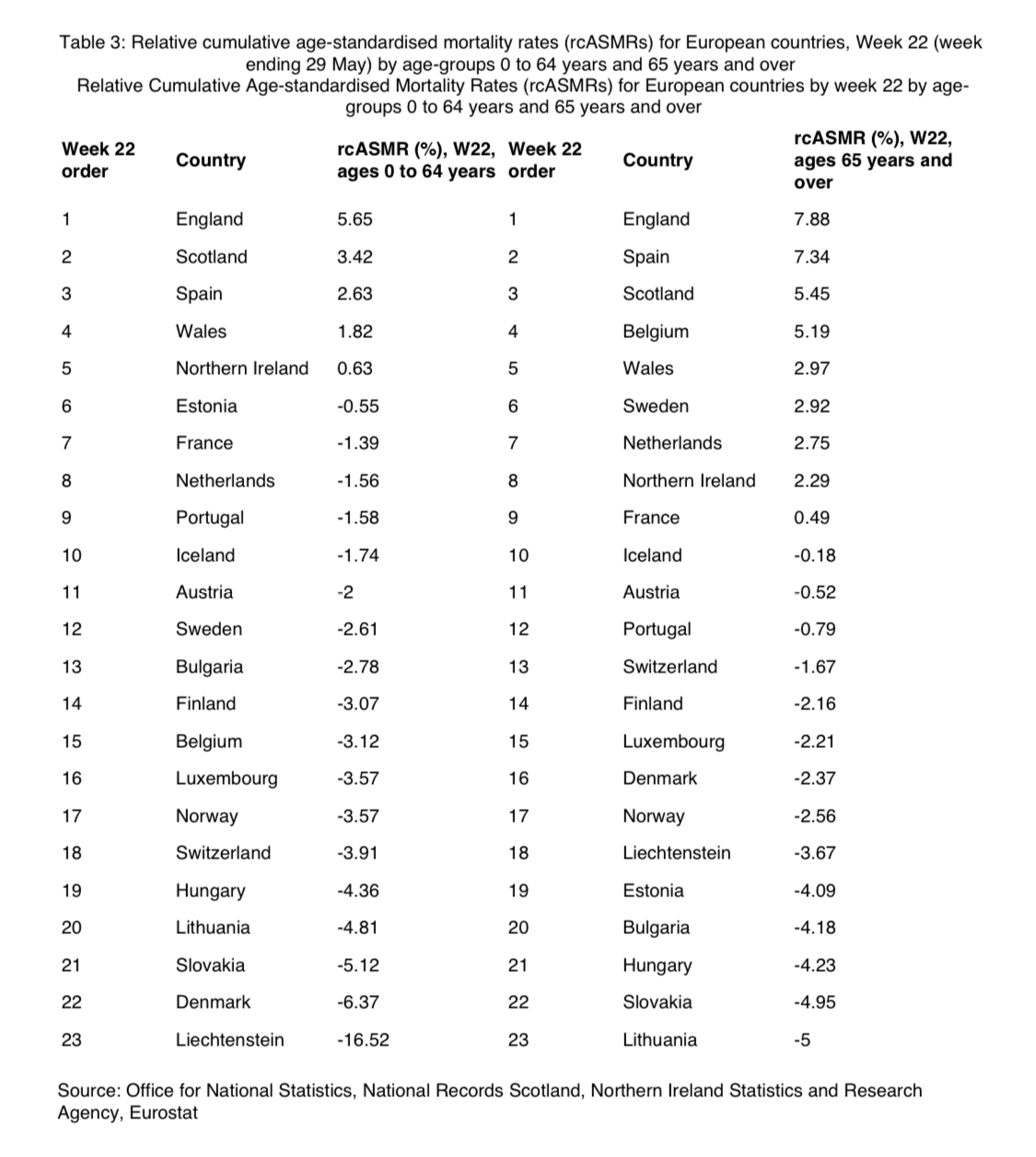
It's difficult not to conclude that both of these Scottish Government advisers are promoting a narrative of Scottish exceptionalism by focusing on the misleading "zero deaths" narrative. In an email exchange with this author, Reicher went so far as to say "... all this is a distraction from the larger point that Scotland is doing better than England, that we need to ask why and learn from it in order to save lives in England."
Is this really the "larger point" that Scottish Government advisers should be focusing on? Is it even true?
The chart below shows (for England, Scotland, and Wales) deaths registered per million population, where COVID-19 was mentioned on the death certificate (so the data is genuinely comparable).
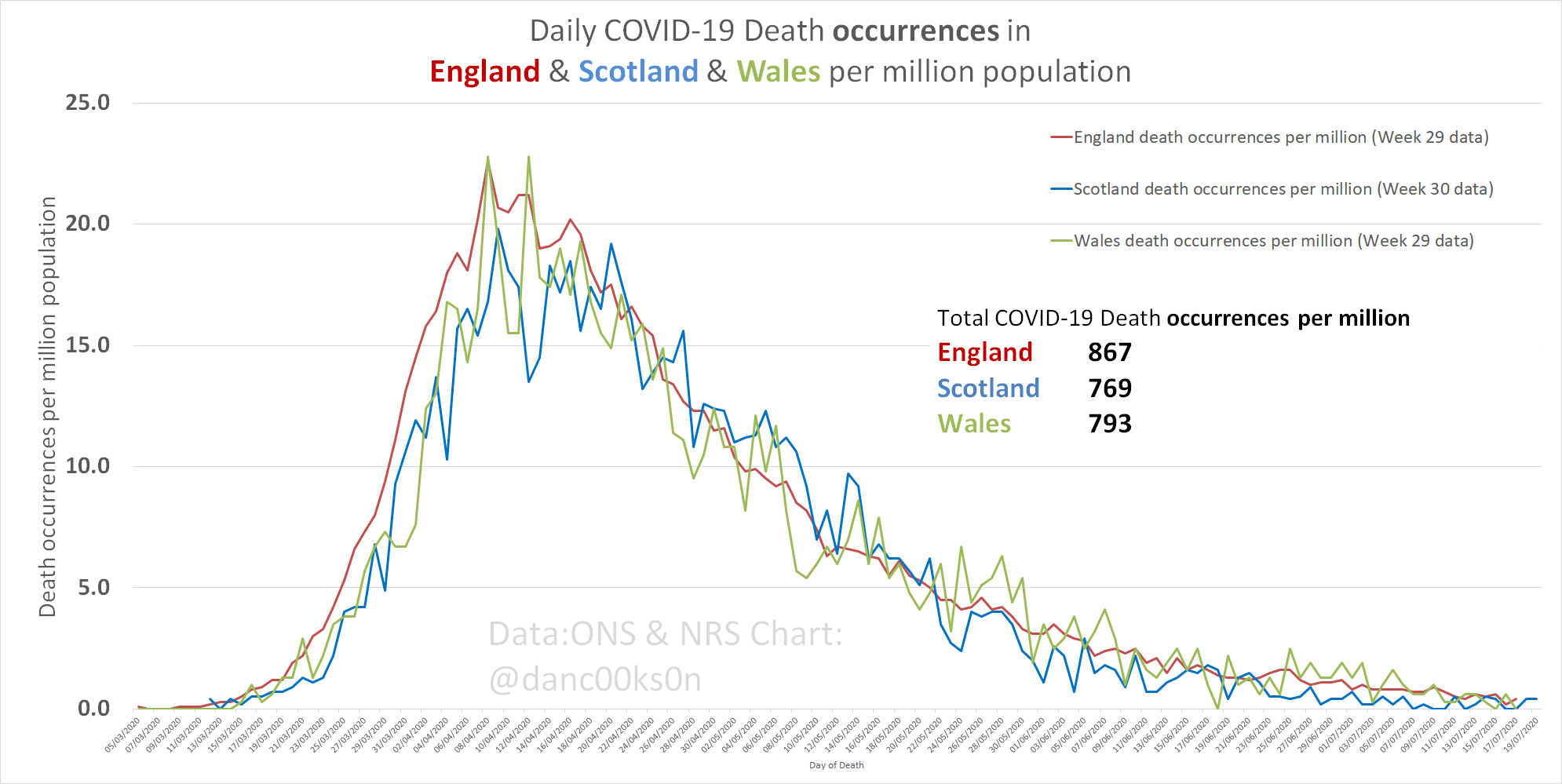
There is clearly very little difference between England, Scotland, and Wales. And of course this chart does not take into account demographic variations.
The region of England which Scotland most closely resembles demographically is the South West. Scotland and South West England have very similar population sizes, and their largest cities – Bristol and Glasgow – are of roughly the same size.
The charts below (sourced directly from NRS8Deaths involving coronavirus (COVID-19) in Scotland, Week 30 (20 to 26 July 2020) and ONS9Deaths registered weekly in England and Wales, provisional: week ending 24 July 2020 respectively) show directly comparable data on deaths by week of registration, where COVID-19 was mentioned in the death certificate, for Scotland and South West England.
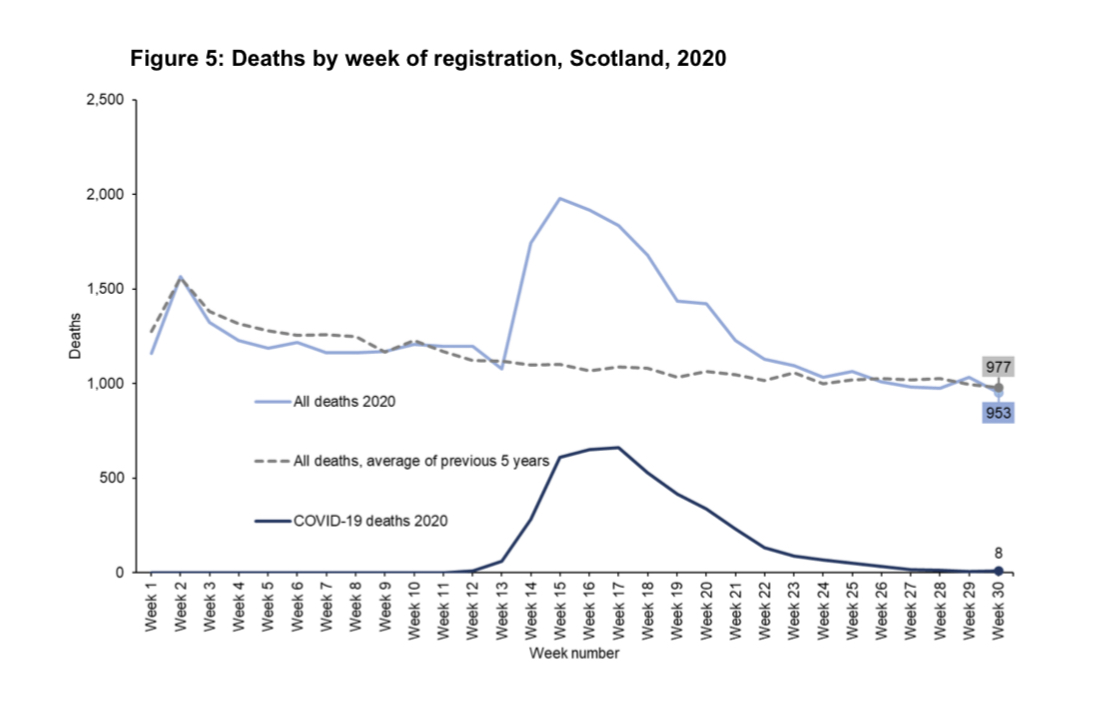
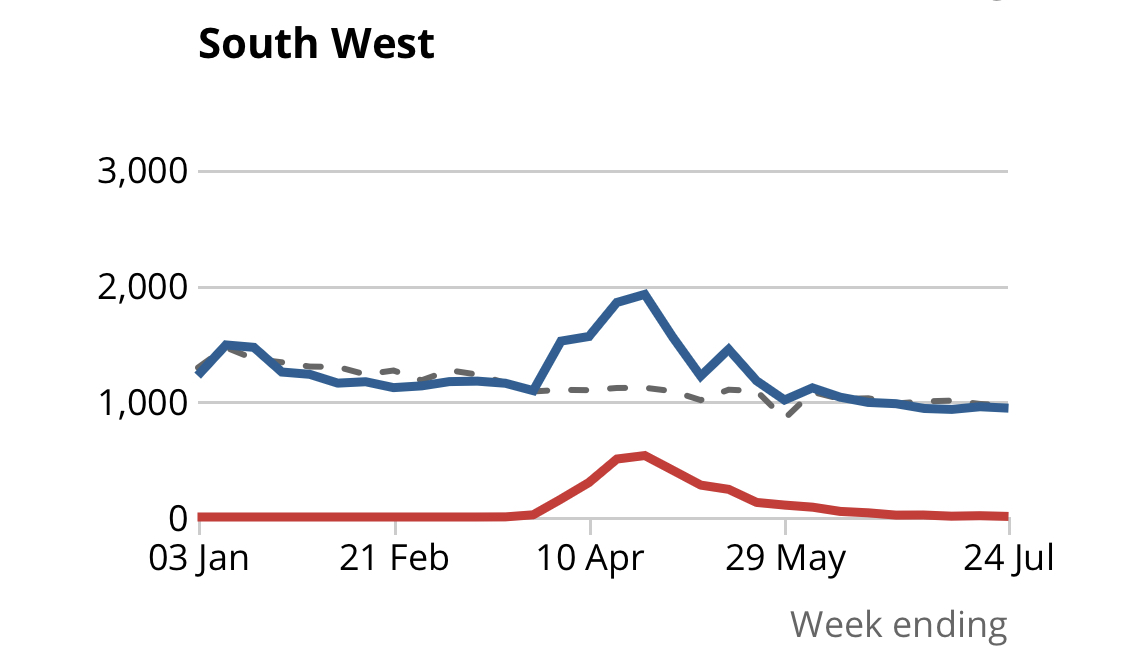

To the naked eye they look very similar, but South West England has actually had considerably fewer COVID-19 deaths than Scotland: 2,878 vs 4,201 (through 24th July in England and 26th July in Scotland).
In the most recent 4 weeks of data (through 24th July in England and 26th July in Scotland), there were 40 COVID-19 deaths in South West England vs 45 in Scotland.
So, overall Scotland has done rather worse than South West England, and on the most recent data there is nothing to choose between them.
It is clearly too soon to judge the effectiveness of different nations' responses to COVID-19, but headlines based on a metric which understates the true extent of COVID-19 deaths in Scotland are fueling an unwarranted narrative of Scottish exceptionalism. It is concerning that (uniquely among the UK nations?) some Scottish Government advisers appear to be using their platforms to promote that narrative.
Please log in to create your comment